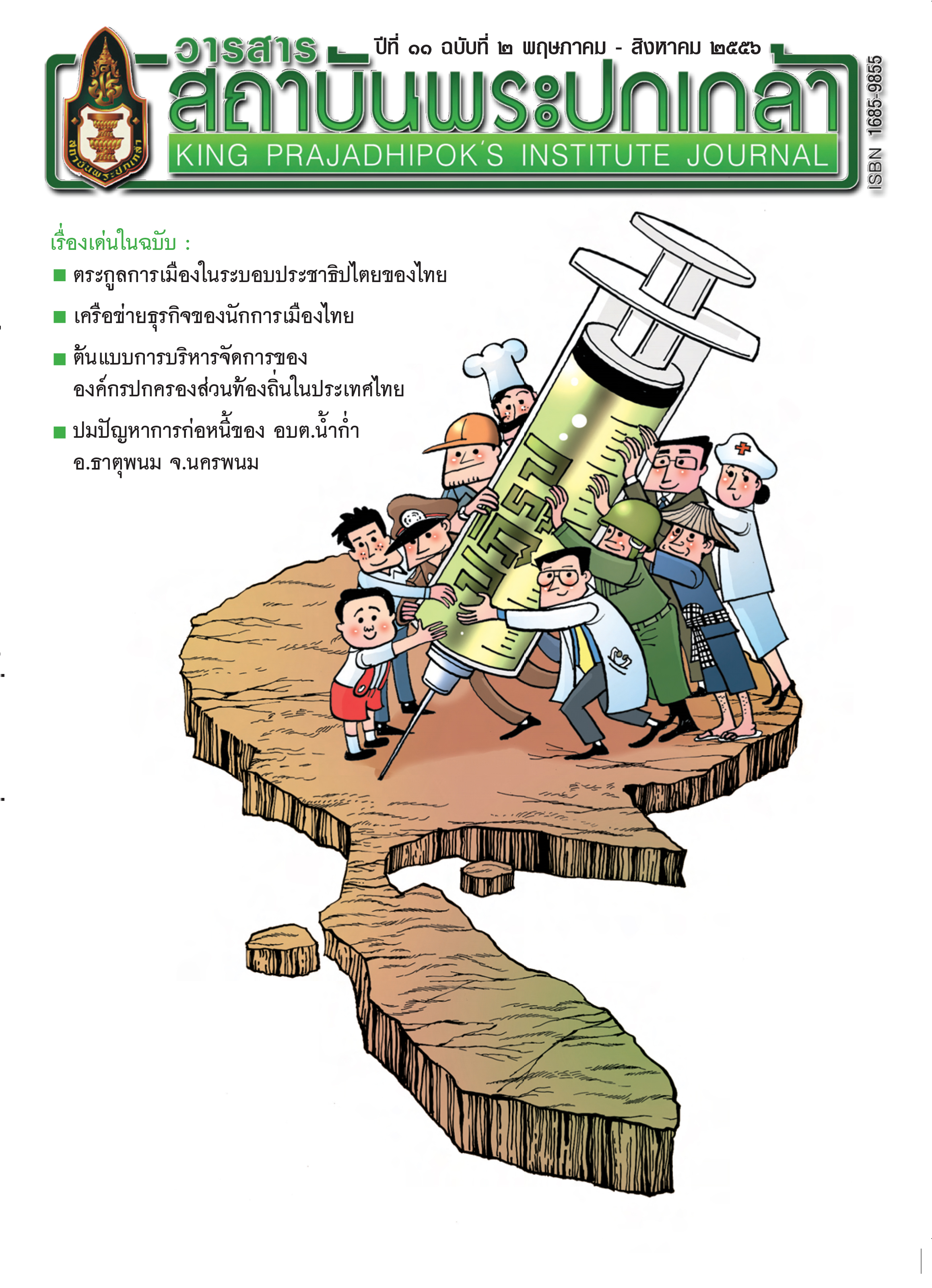ปมปัญหาการก่อหนี้ ของ อบต.น้ำก่ำ อ.ธาตุพนม จ.นครพนม
Main Article Content
Abstract
บทความนี้นำเสนอข้อเท็จจริงและปมปัญหาเกี่ยวกับการก่อหนี้ขององค์การบริหารส่วนตำบลน้ำก่ำ ซึ่งปรากฏเป็นข่าวว่ามีการก่อหนี้จากธนาคารกรุงไทยเป็นจำนวนเงิน ๑๔ ล้านบาทในปี ๒๕๔๘๑ ผลการศึกษาพบว่าปมปัญหาการก่อหนี้ของอบต.น้ำก่ำ มี ๔ ประการที่สำคัญ ได้แก่ การทำหน้าที่ด้านการคลังและงบประมาณของฝ่ายต่างๆ ที่เกี่ยวข้องใน อบต. เกิดความบกพร่อง กลไกที่กำกับดูแลและตรวจสอบด้านการเงินการคลังของ อบต. ยังมิได้ทำหน้าที่โดยสมบูรณ์ ระบบการเงินการบัญชีของท้องถิ่นไม่สามารถนำเสนอข้อมูลฐานะทางการเงินและผลการดำเนินงานด้านการเงินการคลังของ อบต. ได้อย่างถูกต้องและชัดเจน และโครงสร้างการบริหารงานท้องถิ่นให้อำนาจฝ่ายบริหารเข้มแข็งจนปราศจากซึ่งการถ่วงดุลการใช้อำนาจดังกล่าว ดังนั้น จึงควรมีการปรับปรุงระบบงบประมาณและการบัญชีท้องถิ่นให้เป็นไปตามมาตรฐานสากล พัฒนาหลักเกณฑ์การประเมินขีดความสามารถในการชำระหนี้ขององค์กรปกครองส่วนท้องถิ่นให้ชัดเจนและเชื่อถือได้ เสริมสร้างความเข้มแข็งให้กับกลไกการตรวจสอบและการกำกับดูแลท้องถิ่น และส่งเสริมธรรมาภิบาลด้านการคลังท้องถิ่นให้เข้มข้นมากขึ้นต่อไป
Article Details
@ 2020 King Prajadhipok's Institute The Government Complex Commemorating All Right Reserved.
References
จรัส สุวรรณมาลา. ๒๕๕๓. ประชาธิปไตยทางการคลัง. กรุงเทพฯ: ศูนย์ติดตามประชาธิปไตยไทย คณะรัฐศาสตร์ จุฬาลงกรณ์มหาวิทยาลัย.
วีระศักดิ์ เครือเทพ. ๒๕๕๕. ภาษีอากรกับการส่งเสริมประชาธิปไตยในระดับท้องถิ่น. รายงานการวิจัยฉบับสมบูรณ์เสนอต่อศูนย์ติดตามประชาธิปไตยไทย คณะรัฐศาสตร์ จุฬาลงกรณ์มหาวิทยาลัย.
วีระศักดิ์ เครือเทพ. ๒๕๕๔. การวิเคราะห์ฐานะทางการเงินขององค์กรปกครองส่วนท้องถิ่น. กรุงเทพฯ: วิทยาลัยพัฒนาการปกครองท้องถิ่น สถาบันพระปกเกล้า.
สกนธ์ วรัญญูวัฒนา. ๒๕๕๓. วิถีใหม่การพัฒนารายรับท้องถิ่นไทย. กรุงเทพฯ: วิทยาลัยพัฒนาการปกครองท้องถิ่น สถาบันพระปกเกล้า.
Aarsaether, Nils. 1990. Organizational and Spatial Determinants of Fiscal Stress: An Analysis of Norwegian Municipalities. Public Budgeting and Finance. 10(1): 55-66.
Coase, Ronald (1998). “The New Institutional Economics,” American Economic Review, 88(2), 72-74.
Good, David A. 2007. The Politics of Public Money: Spenders, Guardians, Priority Setters, and Financial Watchdogs inside the Canadian Government. Toronto: University of Toronto Press.
Groves, Sanford M., and Maureen G. Valente. 1994. Evaluating Financial Condition: A Handbook for Local Government. Washington, DC: International City/County Management Association.
Guess, George, and Christine Martell. 2006. Development of Local Government Debt Financing Markets: Application of a Market-Based Approach. Public Budgeting and Finance. 26(1): 88-119.
Kloha, Philip, Carol S. Weissert, and Robert Kleine. 2005. Someone to Watch over Me: State Monitoring of Local Fiscal Conditions. American Review of Public Administration. 35(3): 236-255.
Lipnick, Linda H., Yaffa Rattner, and Linda Ebrahim. 1999. The Determinants of Municipal Credit Quality. Government Finance Review. December: 35-41.
Moody’s Investors Service. 2004. Moody’s Approach to Analyzing Municipal Long-Term Debt: A Focus on Local Government Analysis. Moody’s Rating Methodology. February: 1-8.
North, Douglass C. 1990. Institutions, Institutional Change and Economic Performance. Cambridge University Press.
Petersen, John E. 1974. The Rating Game: Report of the Twentieth Century Fund Task Force on Municipal Bond Credit Ratings. New York, NY: Twentieth Century Fund.
Schick, Allen. 1988. An Inquiry into the Possibility of A Budgetary Theory. In New Directions in Budget History. ed. I. S. Rubin, 59-69. Albany, NY: State University of New York Press.
Wildavsky, Aaron. 1975. Budgeting: A Comparative Theory of Budgetary Process. Boston, MA: Little, Brown and Company.
Wildavsky, Aaron. 1984. The Politics of Budgetary Process. Boston, MA: Little, Brown and Company.
Williamson, Oliver E. 2000. The New Institutional Economics: Taking Stock, Looking Ahead. Journal of Economic Literature. 38(3): 595-613.


